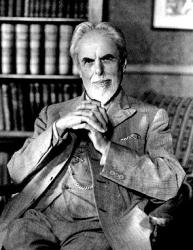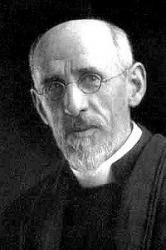Planning worship?
Check out our sister site, ZeteoSearch.org,
for 20+ additional resources related to your search.
- |
User Links
Person Results
Rabanus Maurus

776 - 856 Person Name: Archbishop Rabanus Maurus Author (Ascribed to) of "All prophets hail thee, from of old announcing" in The English Hymnal Rabanus Maurus (c. 776-856) or Hrabanus Magnentius Maurus, was born of noble parents at Mainz, and educated at Fulda and Tours under Alcuin, who is reputed to have given him the surname, Maurus, after the saint of that name. In 803, he became director of the school at the Benedictine Abbey at Fulda. He was ordained priest in 814, spending the following years in a pilgrimage to Palestine. In 822, he became Abbott at Fulda, retiring in 842. In 847, he became archbishop of Mainz. He died at Winkel on the Rhine, February 4, 856. This distinguished Carolingian poet-theologian wrote extensive biblical commentaries, the Encyclopaedic De Universo, De Institutione Clericorum, and other works which circulated widely during the Middle Ages. Some of his poems, with English translations, are in Helen Waddell's Mediaeval Latin Lyrics. He is the author of:
O Come, Creator Spirit, come
Christ, the fair glory of the holy angels
Come, Holy Ghost, our souls inspire
Come, Holy Ghost, Creator blest
Creator Spirit, by whose aid
--The Hymnal 1940 Companion, New York: The Church Pension Fund (1949)
===========================
Hrabanus (Rabanus) Maurus, son of one Ruthard, was born probably at Mainz, about 776. At an early age he was sent to the Monastery of Fulda to receive a religious education. In 801 he was ordained Deacon, and the following year he went to the monastic school of St. Martin at Tours to study under Alcuin, a celebrated teacher of that time, who gave to Hrabanus the name of Maurus to which Hrabanus added Magnentius. On his return to Fulda in 804 he became the head of the school connected with the Monastery. Towards him Ratgar the abbot showed great unkindness, which arose mainly from the fact that Ratgar demanded the students to build additions to the monastery, whilst Hrabanus required them at the same time for study. Hrabanus had to retire for a season, but Ratgar's deposition by Ludwig the Pious, in 817, opened up the way for his return, and the reopening of the school In the meantime, in 814, he had been raised to the Priesthood. Egil, who succeeded Ratgar as abbot, died in 822, and Hrabanus was appointed in his stead. This post he held for some time, until driven forth by some of the community. In 847, on the death of Archbishop Otgar, Ludwig the younger, with whom Hrabanus had sided in his demand for German independence as against the imperialism of his elder brother Lothar, rewarded him with the Archbishopric of Mainz, then the metropolitan see of Germany. He held this appointment to his death on Feb. 4, 856. He was buried first in St. Alban's, Mainz, and then, during the early days of the Reformation, in St. Maurice, Halle, possibly because of the opposition he is known to have made to the doctrine of Transubstantiation.
With German historians Hrabanus is regarded as the father of the modern system of education in that country. His prose works were somewhat numerous, but the hymns with which his name is associated are few. We have the "Christe sanctorum decus Angelorum”; “Tibi Christe, splendor Patris”; and the "Veni Creator Spiritus”; but recent research convinces us that the ascription in each case is very doubtful; and none are received as by Hrabanus in Professor Dümmler's edition of the Carmina of Hrabanus in the Poetae Latini aevi Carolini, vol. ii. 1884. Dümmler omits them even from the "hymns of uncertain origin."
--John Julian, Dictionary of Hymnology, Appendix I (1907)
=======================
http://en.wikipedia.org/wiki/Rabanus_Maurus
Rabanus Maurus
Athelstan Riley
1858 - 1945 Person Name: Athelstan Riley, 1858-1945 Translator of "Christ, the fair glory of the holy angels" in The New English Hymnal Riley, John Athelstan Laurie, M.A., s. of John Riley, Mytholmroyd, Yorks, was born in London, Aug. 10, 1858, and educated at Eton and at Pembroke College, Oxford (B.A. 1881, M.A. 1883). He has been since 1892 a member of the House of Laymen of the Province of Canterbury. He was one of the compilers of The English Hymnal, 1906, and contributed to it seven translations from the Latin (34, 185, 193, 195, 213, 242, 321, with No. 97 previously published), and one from the Greek, beginning, "What sweet of life endureth," from Iiola rod fiiov, p. 899, i., and the following originals:—
1. Come, let us join the Church above. Martyrs.
2. Saints of God! Lo, Jesu’s people. St. Bartholomew. The initials of the lines form the acrostic Saint Bartholomew; it is really a general hymn for Apostles.
3. Ye watchers and ye holy ones. Universal Praise to God. [Rev. James Mearns, M.A.]
--John Julian, Dictionary of Hymnology, New Supplement (1907)
Athelstan Riley
Laurence Housman

1865 - 1959 Person Name: L. H. Translator of "He, whose confession God of old accepted" in The English Hymnal Housman, Lawrence, author and artist, was born July 18, 1867, at Bromsgrove, Worcs. His devotional poetry is principally in his Spikenard, 1898, and Bethlehem, 1902. To the English Hymnal, 1906, he contributed eight translations (142, 188, 191, 228, 229, 230, 231, 234); also three original hymns, with a fourth previously published, viz.:—
1. Lord God of Hosts, within Whose hand. St. George.
2. The Maker of the sun and moon. Christmas. From Bethlehem, 1902, p. 75.
3. The Saint who first found grace to pen. St. Mark.
4. When Christ was born in Bethlehem. Holy Innocents. [Rev. James Mearns, M.A.]
--John Julian, Dictionary of Hymnology, New Supplement (1907)
==================
Born: July 18, 1865, Bromsgrove, Hereford, England.
Died: February 20, 1959, Glastonbury, Somerset, England.
Buried: St. Mary’s, Bathwick, Smallcombe, near Bath.
Housman studied art at the Lambeth School of Art and the Royal College of Art. He had great success as an illustrator, but when his eyesight began to fail, he turned to writing books and plays. He wrote 80 books during his lifetime. He often seemed to fall afoul of the censors, though, for religious and political reasons. A committed socialist and pacifist, in 1907, he helped found the Men’s League for Women’s Suffrage. He was also an honorary associate of the Women Writers’ Suffrage League. His works include:
Jump-to-Glory Jane, by Meredith
Goblin Market, by Christiantina Rossetti, 1893
The End of Elfintown, by Jane Barlow, 1894
Spikenard, 1898
The Sensitive Plant, 1898
Bethlehem, 1902
The Blue Moon, 1904
Angels and Ministers, 1921
Little Plays of St. Francis, 1922
Victoria Regina, 1937
The Unexpected Years, 1937 (autobiography)
--www.hymntime.com/tch
Laurence Housman
Paul, the Deacon
720 - 799 Person Name: Paul the Deacon, 8th cent. Author of "Let thine example, holy John, remind us" in The Book of Common Praise Paul the Deacon [Paulus Diaconus], son of Warnefrid or Winefrid, was born at Frinli, in Italy, circa 730. He studied at Pavia. For some time he was tutor to Adelperga, daughter of Desiderius, the last of the Lombard kings, and then lived at the court of her husband, Arichisius of Beneveuto. Eventually he became a monk at Monte Cassino, where he died circa 799. He was the author of several works, including Be Gest. Langobardorum. His hymn, “Ut queant laxis resonare fibris," is in three parts.
--John Julian, Dictionary of Hymnology (1907)
Paul, the Deacon
T. A. Lacey

1853 - 1931 Person Name: T. A. L. Translator of "All prophets hail thee, from of old announcing" in The English Hymnal Lacey, Thomas Alexander, s. of G. F. Lacey, was b. at Nottingham, Dec. 20, 1853. He entered Balliol Coll., Oxford, as an exhibitioner in 1871 (B.A. 1876, M.A. 1885), was ordained D. 1876, P. 1879, was from 1894 to 1903 Vicar of Madingley near Cambridge, and since then has been Chaplain of the London Diocesan Penitentiary. He was one of the Committee who compiled The English Hymnal, 1906, and contributed to it twelve translations (8, 66, 67, 69, 104, 123, 124, 174, 208, 226, 249, 325), also one unpublished and one previously published original, viz.,
1. O Faith of England, taught of old. [Church Defence.]
2. The dying robber raised his aching brow. [Good Friday.] First in the Treasury, Sept. 1905, p. 482, headed "Sursum."
Three other translations by him are noted at pp. 989, i. 1139, ii. [Rev. James Mearns, M.A.]
--John Julian, Dictionary of Hymnology, New Supplement (1907)
T. A. Lacey
R. Ellis Roberts
1879 - 1953 Person Name: R. E. Roberts Translator of "Let thine example, holy John, remind us" in The Book of Common Praise Roberts, Richard Ellis, was born in London, Feb. 26, 1879, and now (1906) is a journalist, &c, residing at Dorchester, Oxon. He contributed four translations to The English Hymnal,1906.
--John Julian, Dictionary of Hymnology, New Supplement (1907)
R. Ellis Roberts


 My Starred Hymns
My Starred Hymns

